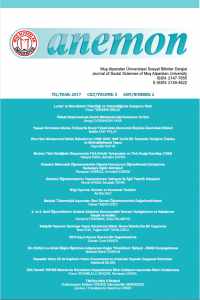Abstract
In the several approaches of language developed with modernity, the language has been discussed in the framework of certain elements. These are ideas, signs and the relations of these with each other. In these approaches of language in question, words are our sole tools as external reality of units of thought. The extent to which characteristics of ideas are represented by these words made into signs of ideas via convention, or namely, by our linguistic signs, is an important factor for us to reach knowledge. The search for accurate knowledge in the seventeenth century also brought about the effort to purify the language off its ambiguity. Therefore, the issue that primarily needed to be a priority for thinkers of the seventeenth century was to find out what was responsible for this deficiency of our linguistic signs and how it could be solved.
One of the most important thinkers of this particular century, John Locke, saw ideas as pieces of the representation of assumed external reality and based knowledge on representation that completely corresponds to reality. Considering the close relationship founded by John Locke between ideas and words via convention, it is revealed that the concept of ‘convention’ does not have the capacity to organize our ideas in a way that is the most suitable for reality. However, Locke, by pursuing a means, although approximate, for opportunity of communication and also due to his ideal of accurate knowledge, refers to convention again. From this point of view, notion of convention arises as the most important element of his language philosophy. Our study, in this context aims to examine how Locke discusses and assesses the deficiency and proficiency of language with reference to convention.
Keywords
References
- Aarsleff, H. (1985). From Locke to Saussure. Minneapolis: University of Minnesota Press.
- Altınörs, A. (2003). Dil Felsefesine Giriş. İstanbul: Inkilap Kitabevi
- Altuğ, T. (2011). Dile Gelen Felsefe. İstanbul: Yapı Kredi Yayınları.
- Aristotle (Ed.) (1941). On Interpreation, The Basic Works of Aristotle. Richard Mckeon (Ed.) and E. M. Edghill (trans.) . Newyork: Random House.
- Bravo, H. (2010:Güz). Locke’un Soyut Genel İde Anlayışı. Felsefe ve Sosyal Bilimler Dergisi, (10), 95-115.
- Dawson, H. (2005). “Free Thinking and Language Planning in late Seventeenth Century England” konulu konferans (Crassh), “A Ridiculous Plan, Locke and the Universal Language Movement” adlı sunum. http://www.lockestudies.org/wp-content/uploads/2013/DawsonLS8:6.pdf.
- Dawson, H. (2007). Language and Early Modern Philosophy. Cambridge University Press.
- Demir, Y. D. (2007). Sosyal Bir Fenomen Olarak Dilin Belirsizliği. İstanbul: Paradigma.
- Locke, J. (2004). İnsan Anlığı Üzerine Bir Deneme. (çev. Vehbi Hacıkadiroğlu). İstanbul: Kabalcı Yayınevi.
- Magee, B. (2000). Büyük Filozoflar, Platon’dan Wittgenstein’a Batı Felsefesi. (çev. Ahmet Cevizci). İstanbul: Paradigma Yayınevi.
- Nayak, B. K. (2003). Locke, Berkeley, Hume and Augustine: A study in the philosophy of language. Meerut: Anu Books.
- Ott, W. R. (2004). Locke’s Philosophy of Language. New York: Cambridge University Press.
Abstract
Keywords
References
- Aarsleff, H. (1985). From Locke to Saussure. Minneapolis: University of Minnesota Press.
- Altınörs, A. (2003). Dil Felsefesine Giriş. İstanbul: Inkilap Kitabevi
- Altuğ, T. (2011). Dile Gelen Felsefe. İstanbul: Yapı Kredi Yayınları.
- Aristotle (Ed.) (1941). On Interpreation, The Basic Works of Aristotle. Richard Mckeon (Ed.) and E. M. Edghill (trans.) . Newyork: Random House.
- Bravo, H. (2010:Güz). Locke’un Soyut Genel İde Anlayışı. Felsefe ve Sosyal Bilimler Dergisi, (10), 95-115.
- Dawson, H. (2005). “Free Thinking and Language Planning in late Seventeenth Century England” konulu konferans (Crassh), “A Ridiculous Plan, Locke and the Universal Language Movement” adlı sunum. http://www.lockestudies.org/wp-content/uploads/2013/DawsonLS8:6.pdf.
- Dawson, H. (2007). Language and Early Modern Philosophy. Cambridge University Press.
- Demir, Y. D. (2007). Sosyal Bir Fenomen Olarak Dilin Belirsizliği. İstanbul: Paradigma.
- Locke, J. (2004). İnsan Anlığı Üzerine Bir Deneme. (çev. Vehbi Hacıkadiroğlu). İstanbul: Kabalcı Yayınevi.
- Magee, B. (2000). Büyük Filozoflar, Platon’dan Wittgenstein’a Batı Felsefesi. (çev. Ahmet Cevizci). İstanbul: Paradigma Yayınevi.
- Nayak, B. K. (2003). Locke, Berkeley, Hume and Augustine: A study in the philosophy of language. Meerut: Anu Books.
- Ott, W. R. (2004). Locke’s Philosophy of Language. New York: Cambridge University Press.
Details
| Journal Section | Research Article |
|---|---|
| Authors | |
| Publication Date | July 1, 2017 |
| Acceptance Date | April 26, 2017 |
| Published in Issue | Year 2017 Volume: 5 Issue: 2 |
Anemon Muş Alparslan Üniversitesi Sosyal Bilimler Dergisi Creative Commons Atıf-GayriTicari 4.0 Uluslararası Lisansı (CC BY NC) ile lisanslanmıştır.


